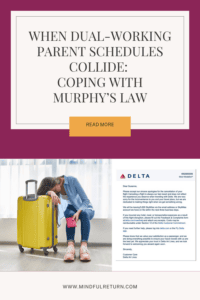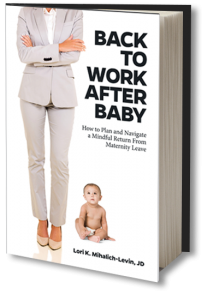 If you’ve been a working parent for longer than five minutes, my guess is that at some point, you’ve experienced Murphy’s law in spades. It doesn’t take long on this parenthood journey to experience the inevitable collision of priorities. Particularly when both parents work for organizations for pay. (Some of my own musings on this point are here: Those Weeks When Nothing Goes Right.)
If you’ve been a working parent for longer than five minutes, my guess is that at some point, you’ve experienced Murphy’s law in spades. It doesn’t take long on this parenthood journey to experience the inevitable collision of priorities. Particularly when both parents work for organizations for pay. (Some of my own musings on this point are here: Those Weeks When Nothing Goes Right.)
A ridiculously fraught workweek recently struck tech leader Susanne Seitinger, who is a Mindful Return alum and mama to 6-year old twins. She last shared her wisdom on this blog when she busted some myths about twins a few years ago. Now she’s back, to tell us about her own schedule collision. Her piece had me laughing, to be sure. But it also offered me a powerful reminder of the perspective we need to take after all the things seem to go wrong.
Thank you, Susanne, for returning to the blog to share your story. May your next work trip go more smoothly!
************************************
In the tech world where I work, we have many laws and predictions. Moore’s law (about circuits). Haitz’s law (about lighting). Kryder’s law (about disc drive density). Metcalfe’s law (about communications networks). I deal with these all day in various capacities. And they offer helpful ways for me to think about technology trends.
But one law continues to boggle my mind: Murphy’s law. As a working parent, we often find ourselves in situations that just seem so unlikely that they feel like fate. It’s as though the universe is speaking to us. But it turns out, it’s just Murphy’s law (i.e. anything that can go wrong, will go wrong!). The best thing to do is to reframe and think of the situation in different terms.
Recently, I faced a classic two-working-parents-with-kids challenge. My husband and I had clashing “extremely important” work commitments, one which involved my traveling to another city that was a 1.5 hour flight away. At the same exact time, we had two slightly sick kids at home. And we had a complex patchwork of summer childcare camps and programs. What are the odds?! Thanks Murphy!
After much agonizing, I changed the timing of my travel plans to accommodate my husband’s commitment. Then, I handed the baton to him to round out what was left of my work trip. On the back end, though, after somewhat smugly thinking to myself how cleverly I’d solved this Rubiks cube, I faced Murphy’s law again.
On my way home, all flights were canceled, all trains were booked, rental cars were unavailable, and I had one last option—the bus. I used to take the bus all the time along the Northeast Corridor. So I thought, “Why not? No biggie.” But then again, Murphy’s law hit.
Our relentless bus driver had to find not one, but two replacement buses after the first two vehicles died on departure. To boot, my phone stopped working (which in this day and age is really tricky when you’re traveling). Finally, on the road, we hit the inevitable traffic (worse now because of our late departure).
Arriving about 3 hours late, I had to take another bus to the airport to retrieve my car, which of course I couldn’t find, because I’d taken a picture of the parking spot on my now unresponsive phone. Leaving the garage also proved interesting, because I had to show the QR code for my parking payment on my laptop. Finally at home—the trip had taken 9 hours vs. the usual 3.5 hours—I started thinking about some of the lessons I learned from this week of being a diligent student of Murphy’s Law.
4 Lessons Murphy’s Law Taught Me
Here are my top four takeaways from the chaos of this past week:
- Don’t make decisions or discuss solutions when everyone is emotional. In my case, and I think typically, situations like clashing work commitments come to a head late at night after the kids are asleep, and the full extent of the seemingly insurmountable challenge comes into focus. We tend to forget that it’s also the worst time for problem solving. Why? We’re likely to be over-tired. And most courses of action aren’t executable in the middle of the night. My husband and I committed to each other that in the future, we would both try to anticipate these kinds of challenges better. We also agreed that we would try to avoid “getting into it” when neither of us are able to think clearly. As Eve Rodsky says in her book, Fair Play, “when emotions are high, cognition is low.”
- The universe is not against you. Just chill out. No matter what it might seem like, the universe is not conspiring to defeat you. You’re just experiencing a series of unfortunate coincidences that maybe—just maybe—also present a gift or an opportunity. (An inspiration from Shirzad Chamine’s coaching system called positive intelligence.) For me, the gift was embracing this as stark reminder that I can’t control everything. And that miraculously everything will be ok.
- No matter what, keep an eye on what’s really most important. Both for my husband and for me, our respective work commitments seemed incredibly important. And they were. But in the greater scheme of things, they are like most events: a moment in time. Of course, it would have been nice to have executed our original plan as we’d laid it out. But in the end, we both did what we needed to do. We showed up where it mattered most.
- Commit to making changes after Murphy strikes. My husband and I agreed that there were a few things we needed to look at changing, including some small things and some big things. Amalgamating them wasn’t a good idea though. For us, we decided to focus on better calendaring systems, building a longer rolodex of babysitters, working on putting work in its place, and (a bigger item) thinking about how our different ways of setting boundaries were working or not working. So some tactical items and some deeper ones. Having named them, though, felt empowering and manageable versus the end-of-the-world scenario we’d been painting.
With all these insights, it’s not lost on me that my challenges, though real and valid just like all the emotions are real and valid, are coming from a place of great privilege and fortune. I have to say that coming back to feeling grateful for an exciting job with folks who actually need you, and having a family to boot, is an incredible gift.
We can’t have everything all the time, but that’s ok. I’m going to keep my comedy of errors trip in mind going forward. And the next time Murphy rears his head, I’ll come up with a better name for him. Maybe something like “working parents’ law,” which stands for the principle that the things that go awry will inevitably make me wiser.
 Susanne Seitinger leads product marketing for AI and machine learning at Amazon Web Services, which keeps her pretty busy these days. She lives in Brookline, MA with her husband—also in tech—and their 6-year-old twins.
Susanne Seitinger leads product marketing for AI and machine learning at Amazon Web Services, which keeps her pretty busy these days. She lives in Brookline, MA with her husband—also in tech—and their 6-year-old twins.
Want more practical tips on working parenthood? Check out my book, Back to Work After Baby: How to Plan and Navigate a Mindful Return from Maternity Leave



